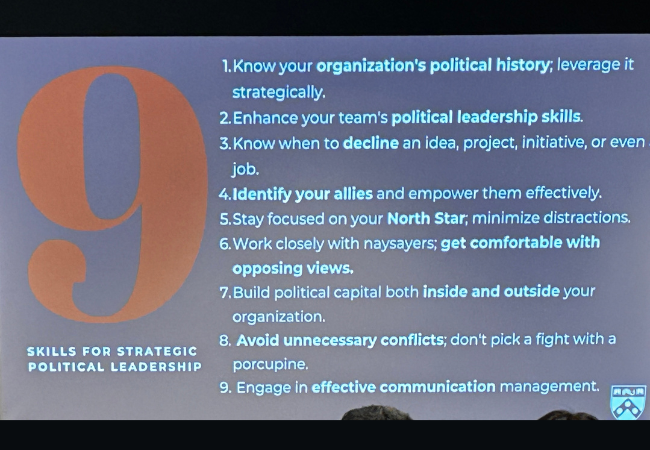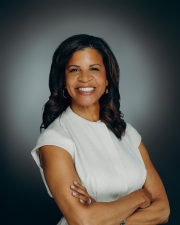McGraw Center hosts symposium aimed at encouraging education leaders to embrace politics

A slide from the McGraw Center’s Leading the Way Symposium presents the “9 Skills for Strategic Political Leadership.” (Kat Stein)
The path of an education leader today is fraught with political potholes — but a leader's best strategy for avoiding those potential dangers is to embrace politics. That was the theme of Thursday’s Leading the Way Symposium hosted by the Penn Graduate School of Education’s McGraw Center for Educational Leadership.
The symposium, which attracted more than 100 education leaders throughout the region and beyond, served as the inaugural event for Cheryl Logan, the founding executive director of the McGraw Center, which opened in June 2023 with the intent to gather great educational minds from Penn GSE along with outside experts to tackle the significant issues facing education today.
Political issues dominate news coverage of education, and the career longevity of education leaders — especially school district superintendents — is dwindling, said Logan, who is a McGraw Prize winner and the former superintendent of the Omaha Public Schools.
“It’s the politics that takes people out, and a lot of that is self-inflicted,” Logan said. “Our intent with this symposium is to give education leaders the tools to navigate the political challenges better and ultimately improve the education experience for students.”
For the symposium, Logan identified nine skills for strategic political leadership to help attendees traverse the challenges of the hyper-political landscape in education. The “divine nine,” as they were referred to during the symposium, were introduced in sets of three by renowned education leaders, including Barry Galasso, former executive director of the Bucks County Intermediate Unit; Edwin Quezada, executive director of the Philadelphia Academy of School Leaders; and Logan.
The nine skills include:
- Know your organization’s political history and leverage it strategically.
- Enhance your team’s political leadership skills.
- Know when to decline an idea, project, initiative, or even a job.
- Identify your allies and empower them effectively.
- Stay focused on your North Star; minimize distractions.
- Work closely with naysayers; get comfortable with opposing views.
- Build political capital both inside and outside your organization.
- Avoid unnecessary conflicts; don’t pick a fight with a porcupine.
- Engage in effective communication management.
Mwenyewe Dawan, assistant superintendent of the Wissahickon School District, said she attended the event because of the importance of the subject and its relevance to her role with the district.
“I am keenly aware that, in my position, politics are always at play,” Dawan said. “It’s important to know how to navigate politics and sharpen our skills as leaders.”
For Reginald Nash, assistant director for state advocacy and engagement for The Education Trust in Washington, D.C., the most appealing aspect of the symposium was the opportunity to interact with and learn from experts.
“Being able to figure out who are the people who align with you and those who look at things differently is important,” Nash said. “Being a student of people is the biggest takeaway for me, especially in these polarizing political times.”
Logan said she would analyze the attendees' feedback from the symposium and explore opportunities for offering additional support for participants through consulting.
You May Be Interested In
Related Stories
- McGraw Center for Educational Leadership launch event brings together students, alumni, and faculty across Penn GSE’s leadership programs
- McGraw Center for Educational Leadership launches with keynote previewing the potential power of AI in the classroom
- Cheryl Logan to lead Penn GSE’s new McGraw Center for Educational Leadership

